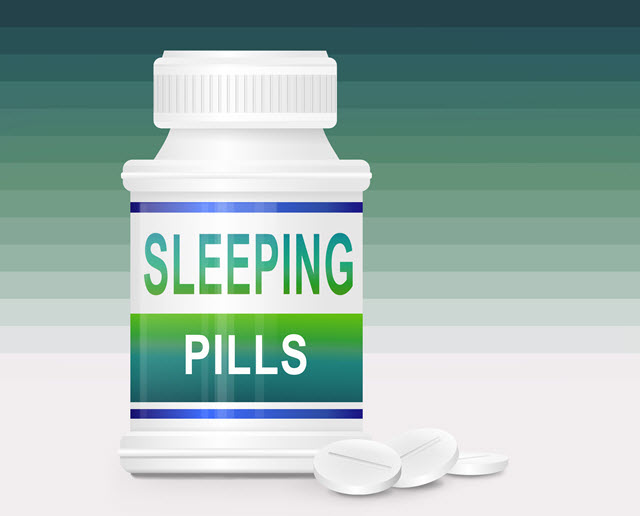If you’re like millions of other people, you occasionally have trouble sleeping. You may toss and turn for hours on end, or wake up in the middle of the night and can’t get back to sleep. If this is a regular occurrence for you, it’s time to consider taking sleeping pills. Sleeping pills can help you get the sleep you need, and they come with a variety of benefits and side effects. In this blog post, we will discuss the different types of sleeping pills available, as well as their benefits and side effects. We will also give you tips on how to get the most from your sleeping pills.
Contents
- 1 Different Types of Sleeping Pills
- 2 How Does Sleeping Pills Work?
- 3 What Does Sleeping Pills Cure?
- 4 Benefits of Using Sleeping Pills
- 5 Are Sleeping Pills Effective?
- 6 Side Effects of Sleeping Pills
- 7 How To Get Most From Sleeping Pills?
- 8 Alternative of Sleeping Pills
- 9 Conclusion
- 10 A Word From Therapy Mantra
What Are Sleeping Pills?
 Sleeping pills are medications that are used to help people fall asleep and stay asleep. They are often prescribed for people who have difficulty sleeping or who have insomnia. Sleeping pills work by depressing the central nervous system, which leads to drowsiness.
Sleeping pills are medications that are used to help people fall asleep and stay asleep. They are often prescribed for people who have difficulty sleeping or who have insomnia. Sleeping pills work by depressing the central nervous system, which leads to drowsiness.
Sometimes, sleeping pills are prescribed for other reasons, such as anxiety or pain. These pills are often a result of a doctor’s prescription.
Different Types of Sleeping Pills
There are many different types of sleeping pills. The most common are benzodiazepines. Some of these are:
Benzodiazepines
These medications are often prescribed for people who have difficulty sleeping or who have insomnia. They work by depressing the central nervous system, which leads to drowsiness. These medications are available in both prescription and over-the-counter forms. These medications include:
- Valium (diazepam)
- Ativan (lorazepam)
- Klonopin (clonazepam)
- Librium (chlordiazepoxide)
- Xanax (alprazolam)
Non-Benzodiazepine Hypnotics
These medications are often prescribed for people who have difficulty sleeping or who have insomnia. They work by depressing the central nervous system, which leads to drowsiness. These medications are available in both prescription and over-the-counter forms. These medications include:
- Ambien (zolpidem tartrate)
- Sonata (zaleplon)
- Lunesta (eszopiclone)
How Does Sleeping Pills Work?
The working of the sleeping pills is not the same for all. Benzodiazepines, as well as some other types of sleeping pills, work by depressing the central nervous system (CNS). This causes sleepiness and a decrease in anxiety. The CNS includes the brain and spinal cord.
Non-Benzodiazepine Hypnotics work by increasing levels of a chemical called gamma-aminobutyric acid (GABA) in the brain. GABA works to inhibit nerve cells from firing too quickly. This helps to produce a calming effect and leads to sleepiness.
These medications also work by depressing the central nervous system (CNS). This causes sleepiness and a decrease in anxiety. The CNS includes the brain and spinal cord.
What Does Sleeping Pills Cure?

Sleeping pills help to cure insomnia, which is the inability to fall asleep or stay asleep. It is one of the most common sleep disorders. About 60 million people in the United States suffer from it.
It can also help with other sleep problems such as:
Restless legs syndrome (RLS)
This is a disorder that causes a strong urge to move your legs. This happens mainly when you are trying to sleep or rest. This syndrome can cause difficulty sleeping. Sometimes, it can also cause pain in the legs.
Narcolepsy
This is a disorder that causes people to fall asleep suddenly and without warning. This can happen during the day or at night. People with narcolepsy often have trouble staying awake during the day.
Chronic Pain
Some people who have chronic pain conditions find that they have difficulty sleeping because of the pain. Sleeping pills may help them get more restful sleep.
Benefits of Using Sleeping Pills

There are many benefits of using sleeping pills. Some of these include:
Helps To Sleep Faster
This medication can help people fall asleep faster. This is especially helpful for those who have difficulty falling asleep or who have insomnia. Sometimes, people who take these pills can fall asleep in less than 15 minutes.
Helps To Stay Asleep
This medication can also help people stay asleep. This is helpful for those who have difficulty staying asleep or who have insomnia. People who take this medication often sleep through the night without waking up.
Decreases Anxiety
This medication can also help to decrease anxiety levels. This is helpful for those who have trouble sleeping because of their anxiety. When anxiety is reduced, it can lead to a better night’s sleep.
May Improve Mood
Some people find that they have a better mood when they take this medication. This may be due to the fact that they are getting more restful sleep at night. A good night’s sleep can help to improve mood.
May Help With Chronic Pain
Some people who have chronic pain conditions find that they have difficulty sleeping because of the pain. Sleeping pills may help them get more restful sleep. This can lead to a better quality of life overall.
Are Sleeping Pills Effective?
 The effectiveness of sleeping pills varies from person to person. Some people find that they work great and help them get the sleep they need. Others find that they do not work well for them or that they have side effects.
The effectiveness of sleeping pills varies from person to person. Some people find that they work great and help them get the sleep they need. Others find that they do not work well for them or that they have side effects.
It is important to talk with your doctor if you are considering taking sleeping pills. He or she can help you decide if this medication is right for you and can prescribe the best type of pill for your needs.
Some doctors suggest too many sleeping pills can lead to addiction. Doctors always prescribe sleeping pills after a full examination.
Side Effects of Sleeping Pills

There are some side effects associated with using sleeping pills. Some common ones include:
Drowsiness
This is one of the most common side effects of these medications. It occurs because the medication depresses the central nervous system (CNS). This leads to a feeling of fatigue and sleepiness.
Difficulty Breathing
This is another common side effect that can occur when taking sleeping pills. It is caused by the suppression of the central nervous system (CNS). This can lead to a decrease in the amount of oxygen that is getting to the brain.
Dizziness
This is another common side effect that can occur when taking sleeping pills. It is caused by the suppression of the central nervous system (CNS). This can lead to a feeling of lightheadedness and dizziness.
Rebound Insomnia
Sometimes, people who take sleeping pills may find that they have difficulty sleeping after they stop taking them. This is known as rebound insomnia. It occurs because the person’s body has become used to having the medication in their system. When it is stopped, the person may have trouble falling asleep or staying asleep.
Dry Mouth
Dry mouth is another common side effect of sleeping pills. It is caused by the medication’s ability to decrease saliva production. This can lead to a feeling of dryness in the mouth.
Nausea
This is another common side effect. People often feel sick to their stomachs and may vomit when they take this medication. This usually goes away after a few days of use as well.
Headache
Some people get headaches when they take this medication. This usually goes away after a few days of use as well.
Stomach Problems
People who take sleeping pills may sometimes have stomach problems such as nausea, vomiting, or diarrhea.
Allergic Reaction
Some people may have an allergic reaction to the medication. This can cause symptoms such as rash, hives, swelling, or difficulty breathing.
How To Get Most From Sleeping Pills?

There are some things that people can do to get the most from their sleeping pills. Some of these include:
Take Them As Directed
It is important to take these medications as directed by your doctor. Do not take more than prescribed or you may experience adverse effects. You can also become dependent on the medication if you take too much.
Avoid Alcohol and Other CNS Depressants
It is also important to avoid drinking alcohol or taking other CNS depressants while taking sleeping pills. This can lead to increased side effects from the medication.
Use Them Only When Needed
These medications should only be used when needed. Do not take them every day, as this can lead to dependence on the drug. Try to reserve them for times when you have difficulty sleeping.
Talk To Your Doctor About Alternatives
If you are experiencing adverse effects from using sleeping pills, talk to your doctor about alternatives. There may be other medications that can help you get a good night’s sleep without causing these problems. You can also try non-pharmacological treatments, such as cognitive-behavioral therapy (CBT) for insomnia.
Make a List of Potential Side Effects
Before taking sleeping pills, it is important to know the potential side effects. This can help you be aware of what to look for if you experience any problems while taking them. You can also discuss these side effects with your doctor.
Remember That Everyone Responds Differently
Not everyone will respond the same way to a particular medication. What works for one person may not work for another. It is important to talk to your doctor about what options are available to you. They can help you find the best medication and dosage for you.
Alternative of Sleeping Pills

There are many alternatives to sleeping pills. Some of these are:
Melatonin
This is a hormone that is naturally produced by the body. It helps to regulate sleep-wake cycles. Melatonin can be taken as a supplement to help people fall asleep and stay asleep.
Herbal Supplements
There are many herbal supplements that have been shown to promote sleep. Some of these include valerian, chamomile, lavender, and passionflower. These supplements can be taken in pill form or brewed as a tea.
Acupuncture
This is a type of Chinese medicine that involves inserting needles into specific points on the body. Acupuncture has been shown to be effective in treating insomnia.
Yoga
Yoga has been shown to be an effective way to improve sleep quality. It combines stretching and relaxation exercises with deep breathing. This can help to calm the mind and body.
Talk To Your Doctor
If you are having trouble sleeping, talk to your doctor. They can help you find a treatment that is right for you. They may recommend one of the options listed above or another medication. There are many treatments available for insomnia, so there is sure to be something that will work for you.
Conclusion
Sleep is essential for overall health and well-being. If you are having difficulty sleeping, there are many treatments available that can help. Talk to your doctor about the best treatment for you. There are many options available, so there is sure to be something that will work for you.
A Word From Therapy Mantra
Your mental health — your psychological, emotional, and social well-being — has an impact on every aspect of your life. Positive mental health essentially allows you to effectively deal with life’s everyday challenges.
At Mantra Care, we have a team of therapists who provide affordable online therapy to assist you with issues such as depression, anxiety, stress, relationship, OCD, LGBTQ, and PTSD. You can take our mental health test. You can also book a free therapy or download our free Android or iOS app.


